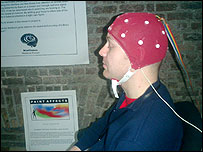 Could your remote control
Brain pacemaker lifts depression
Fitting patients with a brain pacemaker could switch off hard-to-treat depression, believe UK experts.
The technology, already used to treat Parkinson's disease, uses wires and a battery source to stimulate deep parts of the brain with electric currents.
As well as helping depressed patients who have failed on all other therapies, it might also be helpful for treating obsessive compulsive disorder (OCD).
The device that she used consists of a matchbox-sized, battery-powered generator that sits in the chest, much like a heart pacemaker, and produces the electric currents.
- BBC
|
 The "chip" reads brain signals
Brain chip reads man's thoughts
A paralysed man in the US has become the first person to benefit from a brain chip that reads his mind.
Matthew Nagle, 25, was left paralysed from the neck down and confined to a wheelchair after a knife attack in 2001.
The pioneering surgery at New England Sinai Hospital, Massachusetts, last summer means he can now control everyday objects by thought alone.
The brain chip reads his mind and sends the thoughts to a computer to decipher.
He can think his TV on and off, change channels and alter the volume thanks to the technology and software linked to devices in his home.
- BBC
|

